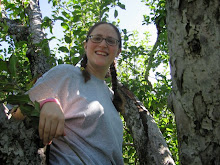Today was the Shabbat before Rosh Hashana. So tonight, at midnightish is the Selichot Service. Selicha in Hebrew, means to pardon, or excuse. So basically, in this repentant time of year for Jews, we begin to ask Gd for pardon, for forgiveness, and to please excuse us for our sins of this past year, so that we may be Inscribed in the Book of Life for a Sweet New Year.
Currently, on the Hebrew Calandar, the month of Elul, (the month before Rosh Hashana, the last month of the Hebrew Year) is coming to a close. The month of Elul is a time of repentance in preparation for the High Holidays. Tradition teaches us that the month of Elul is a particularly good time for repentance. This mood of repentance builds through the month of Elul to the period of Selichot, to Rosh Hashanah, and finally to Yom Kippur.
The name of the month (spelled with the Hebrew letters Alef-Lamed-Vav-Lamed) is said to be an acronym of "Ani l'dodi v'dodi li," "I am my Beloved's and my Beloved is mine," a quote from Song of Songs 6:3, (I THINK it is also part of the Ketubah, the Jewish marriage contract, but I may be wrong. You can let me know about that one. The phrase is definitely a part of Jewish love and marriage tradition.) But here, in Elul, it is said to mean that the Beloved is G-d and the "I" is the Jewish people, and their "marriage" though the Covenant made. In Aramaic, the word "Elul" means "search," which is appropriate, because this is a time of year in which we search our hearts.
In the idea of repentance and forgiveness, according to tradition, the month of Elul is the time that Moses spent on Mount Sinai preparing the second set of tablets after the incident of the golden calf. (Ex. 32; 34:27-28) He ascended on Rosh Chodesh Elul and descended on the 10th of Tishri, at the end of Yom Kippur, when repentance was complete. Other sources say that Elul is the beginning of a period of 40 days that Moses prayed for G-d to forgive the people after the Golden Calf incident, after which the commandment to prepare the second set of tablets was given.
As the month of Elul draws to a close, the mood of repentance becomes more urgent. Prayers for forgiveness called "selichot" are added to the daily cycle of religious prayers. Selichot are recited in the early morning, before normal daily morning prayers. Selichot are recited from the Sunday before Rosh Hashanah until Yom Kippur. The first selichot service of the holiday season is usually a large community service, held around midnight after Shabbat. The entire community, including men, women and older children, attend the service, and the rabbi gives a sermon. The remaining selichot services are normally only attended by those who ordinarily attend daily shacharit services in synagogue.
So that big community Selichot Service is tonight. I don't think I am going to attend this year, I rarely do, it's usually just too late for me. But in the spirit of Selichot and Elul, I hold fast to another tradition of the month. Because Elul is also a time to begin the process of asking for forgiveness for wrongs done to other people. According to Jewish tradition, Gd cannot forgive us for sins committed against another person until we have first obtained forgiveness from the person we have wronged. This process of seeking forgiveness continues through the Days of Awe and Yom Kippur.
So after this long explanatory BLOG entry, I ask this of the world.
Please forgive me. If I know you, or don't know you. If I have ever offended you in any way, shape, or form. If I have ever done you wrong in any way, If I have ever done anything that might hurt you, knowingly or unkowingly, I ask your forgiveness. Please let me know of these wrongs so that I might not repeat them in the future. I ask you please, pardon my wrongdoings on your behalf, I am truly sorry, and I hope that I might never offend you or hurt you again.
Thank you for your forgiveness. And L'Shana Tova Tikatayvu. Many Blessings for a Happy and Sweet New Year.
Saturday, September 11, 2004
Subscribe to:
Post Comments (Atom)

No comments:
Post a Comment